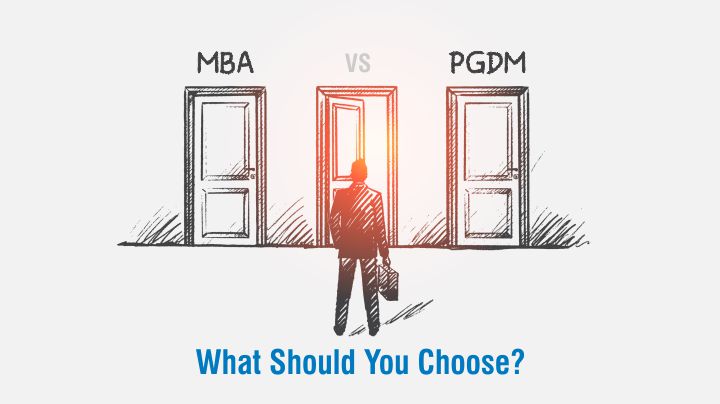MBA Degree Vs. PGDM Diploma Course: Understanding The Difference
In the realm of business education, two prominent options stand out: the Master of Business Administration (MBA) degree and the Post Graduate Diploma in Management (PGDM) course. While both are esteemed qualifications, they differ in various aspects, ranging from curriculum structure to accreditation. Understanding these differences can help aspiring business professionals make informed decisions about their educational pursuits and career paths.

1. Recognition and Accreditation:
- ▪️MBA: The MBA degree is typically offered by universities and is recognized worldwide. Universities offering MBA programs are often accredited by recognized bodies, enhancing the degree’s credibility.
- ▪️PGDM: The PGDM course is offered by autonomous institutions and management schools approved by the All India Council for Technical Education (AICTE) or other regulatory bodies. While PGDM courses are highly regarded, the accreditation of the institution plays a significant role in the diploma’s recognition.
2. Curriculum and Flexibility:
- ▪️MBA: MBA programs often follow a more traditional academic structure, with a fixed curriculum focusing on core business subjects such as finance, marketing, and human resources. There is limited flexibility in choosing elective courses.
- ▪️PGDM: PGDM courses are known for their flexibility and industry relevance. Institutions offering PGDM can adapt their curriculum quickly to align with changing industry trends and demands. This allows students to gain up-to-date knowledge and skills that are highly relevant in the current business landscape.
3. Emphasis on Practical Skills:
- ▪️MBA: While MBA programs incorporate practical aspects, they are more theory-oriented. The emphasis is often on developing a strong theoretical foundation in business concepts.
- ▪️PGDM: PGDM courses prioritize practical learning and skill development. Students are exposed to real-world business scenarios through case studies, internships, and industry interactions, preparing them for the challenges of the corporate world.
4. Duration and Intensity:
▪️MBA: MBA programs are typically longer, spanning two years of full-time study. Part-time and executive MBA programs are also available for working professionals.
▪️PGDM: PGDM courses are usually shorter, lasting around 1-2 years. The shorter duration is often attributed to the focused nature of the curriculum and the emphasis on practical skills development.
5. Career Opportunities and Networking:
- ▪️MBA: The brand value of an MBA degree from a reputed university can open doors to a wide range of career opportunities. MBA graduates often benefit from extensive alumni networks.
- ▪️PGDM: PGDM graduates also have access to a plethora of career opportunities, especially if they have graduated from a well-known institution. Networking opportunities in PGDM programs are often industry-focused, facilitating connections with professionals in specific sectors.
In conclusion, both the MBA degree and PGDM diploma course offer valuable insights and skills necessary for a successful career in business. The choice between the two depends on individual preferences, career goals, and the reputation of the institution offering the program. Regardless of the path chosen, both qualifications can significantly enhance one’s prospects in the competitive world of business.


